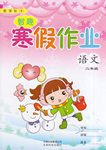题目内容
Don’t look down upon people dressed in r__________.
rags

 智趣寒假作业云南科技出版社系列答案
智趣寒假作业云南科技出版社系列答案Research shows that childhood friendships are important indicators of future success and social adjustment. Children's relationships with peers (同龄人) strongly influence their success in school, and children with fewer friends are more likely dropping out of school, becoming sad and other problems.
Making and Keeping Friends Is More Than Child's Play
When 6-year-old Rachel returned to school on a recent Monday morning, her eyes immediately scanned the playground for her friend Abbie. Though they were only separated by a weekend, the girls "ran right into each other's arms and hugged," recalls Rachel's mother Kathryn Willis of Gilbert. "It was like a scene from a movie."
Most parents instinctively (本能地) know that having friends is good for their child. Experts agree that friendship is not simply child's play, but a powerful predictor of social adjustment throughout life.
A Skill for Life
"Childhood friendships serve as a very important training ground for adulthood," says Dr. Robbie Adler-Tapia, psychologist with the Center for Children's Health & Life Development.
Researcher William Hartup states, "Peer relations contribute significantly to both social and cognitive (认知的) development." Hartup concludes that the single best childhood predictor of adult social adaptation is not school grades or classroom behavior, but rather, how well a child gets along with other children.
The work of Arizona State University proves that just as being able to make and keep friends is beneficial to kids, so is the lack of friends detrimental.
Good Friendships Don't Just Happen
Experts agree that it is basic for children to develop high-quality friendships. But, researchers warn, these friendships don't necessarily just happen. Often, a good friendship begins with involved (卷入,牵连)parents.
Valley psychologist Dr. Lynne Kenney Markan believes kids should be taught social skills in much the same way they are taught math and reading.
Bad Company
Many parents worry about the quality as well as the quantity of their child's friendships. "When she was in 1st grade, her supposed 'best friend' began calling her names and threatening to hurt her," says Mindy Miller. "My daughter wasn't allowed to talk to or even look at other girls in her class. It really crushed (压跨) her spirit. I told my daughter she didn't need a 'friend' like that."
"I'll bend over backwards to help my son get together with a friend I think is good for him," Adler-Tapia says. "I don't look at it as manipulation (操纵), just positive parental involvement. "
【小题1】The example of Rachel and Abbie is used to show that ________.
| A.childhood friendship is of great benefit to their growth |
| B.a positive friendship helps children solve emotional and physical problems |
| C.it is a proven(被证明的) fact that peer friendship is the most rewarding experience throughout life |
| D.Rachel missed her friend Abbie very much because of their separation of one weekend |
| A.valuable | B.disappointing | C.accurate | D.harmful |
| A.social skills and good study habits |
| B.school grades and classroom behaviors |
| C.academic success and social adaptation |
| D.positive parental involvement and social skills |
| A.parents should regard making friends as something that just happens |
| B.it's wise for parents to support and encourage healthy peer relationships |
| C.parents only need to help their children to deal with difficult social situations |
| D.parents are supposed to encourage their children to make as many friends as they can |
I was feeling a little blue. My mother had been laid off from her job, but she said she was OK since her boss wasn't the nicest person 36 .
I got off the college bus and started walking. That's 37 I heard piano music and singing rising above the 38 of the people and the traffic. I walked a little slower 39 I could find out where it was coming from. 40 the crowd I saw a young lady sitting at a piano with a 41 next to her, singing songs about love. The way she was singing 42 me a bit. I stood there watching her 43 for about fifteen minutes, thinking that it must take 44 to perform on her own in public.
Feeling my presence, she looked in my 45 . I walked over and put some money in her carriage. “I have been going through a 46 time lately, but you’re made me hopeful again.”
"I'm happy that I could 47 . Why are you so sad?"
"Well, my mum had got 48 from her job, but I’m not sure what to do….”
"You see, the way you were 49 ," she explained. “Don't look defeated, 50 comes in different ways. If your head is down you might never see it. Smile more ... 51 your head up."
I smiled slightly, amazed by how she was 52 me.
“Why are you playing here?” I asked.
“I am not making music. I study psychology. I often see many 53 people and hope to relieve their 54 and make them think positively by sharing music.”
I smiled a little wider. She was doing a good thing. My heart was touched by a 55 soul.
|
1. |
|
|
2. |
|
|
3. |
|
|
4. |
|
|
5. |
|
|
6. |
|
|
7. |
|
|
8. |
|
|
9. |
|
|
10. |
|
|
11. |
|
|
12. |
|
|
13. |
|
|
14. |
|
|
15. |
|
|
16. |
|
|
17. |
|
|
18. |
|
|
19. |
|
|
20. |
|